Tomboy (2011): too young to know? | ¿muy joven para saberlo?
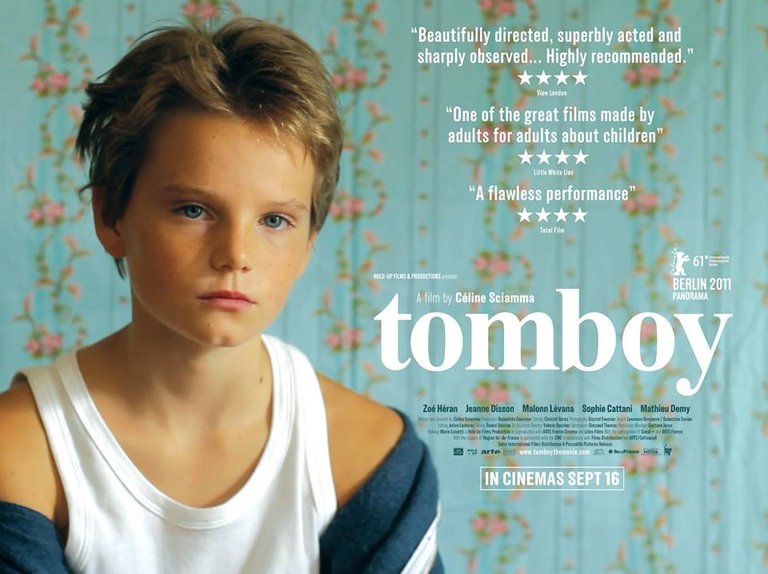
De la directora de Retrato de una mujer en llamas
Coming-of-age novels and films (and transitional ones) provide good stories because they deal with conflicted characters. The passage from one stage to another, from childhood to adolescence, from adolescence to youth, from youth to adulthood, and finally going from being an adult to being considered old, are situations in which identity is shaken: one stops being what one has been until then to become something one has never been. Perhaps it's less dramatic at more advanced ages, but even so it's an internal struggle, an aversion to change.
Las novelas o películas de iniciación (y las de transición) dan buenas historias porque abordan personajes conflictuados. El paso de una etapa a otra, de la niñez a la adolescencia, de la adolescencia a la juventud, de ésta a la adultez, y finalmente pasar de ser adulto a ser considerado viejo, son situaciones en las que la identidad se ve sacudida: se deja de ser lo que se ha sido hasta entonces para ser algo que nunca se ha sido. Quizás es menos dramático en las edades más avanzadas, pero aún así se trata de una lucha interna, una aversión al cambio.
Of course, of all these possibilities, childhood and adolescence are the most striking or those that give rise to the most intense, most memorable characters. Eugenia Blanc, Holden Caulfield or Emil Sinclair are unthinkable outside of their youth because, in addition to the transition to a new stage, adolescence brings with it the discovery of the world, the death of the father, sexual awakening and the first sketches of an identity that may be preserved for the rest of one's life. This turning point in a person's path begins, I would say, more or less at age ten, which is exactly the age that Laure, the protagonist of Tomboy, is when the film begins. During a vacation period, Laure's family, father, mother and her younger sister Jeanne, move to the outskirts of Paris and that means a quieter environment than the city center, where the neighborhood children go out to play almost every afternoon. It's not clear what year the film is set in, but it seems to be contemporary, and yet the children appear playing in the woods, racing, jumping into a lake, and not absorbed in playing on a console or glued to a smartphone, and that is appreciated; that is, showing what was the most natural, most organic childhood in which only imagination, will and sometimes a ball were required to indulge in hours of fun. In short, Laure goes out every afternoon to meet and share with her new neighbors and everything seems to go well, they give her a place in the group and in the games, except for one detail: no one knows that Laure is a girl.
Claro que de todas esas posibilidades, la infancia y la adolescencia son las más llamativas o las que dan personajes más intensos, más memorables. Eugenia Blanc, Holden Caulfield o Emil Sinclair son impensables fuera de su juventud porque además de la transición a una nueva etapa, la adolescencia trae consigo el descubrimiento del mundo, la muerte del padre, el despertar sexual y los primeros esbozos de una identidad que tal vez se conserve para el resto de la vida y este punto de inflexión en el camino de las personas comienza, diría yo, más o menos, a los diez años, que es justamente la edad que tiene Laure, la protagonista de Tomboy, cuando arranca la película. Durante un período de vacaciones, la familia de Laure, padre, madre y su hermana menor Jeanne, se mudan a las afueras de París y eso significa un ambiente más tranquilo que el centro de la ciudad, en donde los niños del vecindario salen a jugar casi cada tarde. No se aclara en qué año está ambientada la película, pero parece ser la contemporaneidad y sin embargo, los niños aparecen jugando en el bosque, a las carreras, saltando a un lago, y no ensimismados jugando en una consola o pegados a un smartphone y eso es de agradecer; es decir, mostrar eso que era la niñez más natural, más orgánica en la que sólo se requería la imaginación, voluntad y a veces una pelota para entregarse a horas de diversión. En fin que Laure sale cada tarde a conocer y compartir con sus nuevos vecinos y todo parece salir bien, le dan cabida en el grupo y en los juegos, excepto por un detalle: ninguno sabe que Laure es una niña.

And this is because she herself has told them that his name is Michael. His appearance and his haircut, as well as the clothes he usually wears, help her convince others that she's a boy and little by little, afternoon after afternoon, the different interactions with her neighbors will lead Laure to reinforce that character that is Michael: a somewhat shy ten-year-old boy who likes football and who begins to arouse the interest of one of the other girls in the group called Lisa.
Y es así porque ella misma les ha contado que se llama Michael. Su aspecto y su corte de cabello, además de la ropa que suele utilizar, la ayudan a convencer a los demás de que es un niño y poco a poco, tarde tras tarde, las diferentes interacciones con sus vecinos llevarán a Laure a reforzar ese personaje que es Michael: un chico de diez años algo tímido a quien le gusta el fútbol y que comienza a despertar el interés de una de las otras niñas del grupo llamada Lisa.
At this point in history, a lot of water has flowed under the bridge. It was one thing to talk about sexual identity or gender thirty years ago, and another thing to do so now. The clothes a girl wears, her habits, whether she plays basketball, or likes toy cars, or dolls, are not as decisive or condemned today as they were in the past. However, that doesn't mean that children today have it any clearer. An eight or ten year old child is most likely in school and is part of a group in which comments, references and different pressures are inevitable, and that, added to the development of one's own personality, can lead the child to question many things. When Laure/Michael realizes that Lisa is attracted to her/him, she decides to reciprocate. Lisa seems pretty to her, does that mean she's a lesbian? Is it too soon to start asking those questions? Is it okay for a ten year old girl to kiss another girl like that almost spontaneously? There are many questions that one could ask along these lines, but the real questions, I think, the ones that matter a bit more, are those that have to do with Laure's identity: why does Laure pretend to be a boy? Does she feel like one? Is it a phase of her pre-adolescence? Does it have to do with some event from the past? Is it something definitive? None of this is clarified in the film and this ambiguity, which some may find insufficient, others may find stimulating because it leads us to fill in those gaps with different hypotheses and theories.
A estas alturas de la historia ya ha corrido mucha agua bajo el puente. Una cosa era hablar de identidad sexual o géneros hace treinta años y otra cosa es hacerlo ahora. La ropa que se ponga una niña, sus hábitos, que si juega baloncesto, o le gustan los autos de juguete, o las muñecas, no son hoy tan determinantes o condenadas como lo eran en el pasado. Sin embargo, eso no quiere decir que los niños de ahora lo tengan más claro. Un niño de ocho o diez años, lo más seguro es que esté escolarizado y que haga parte de un colectivo en el que son inevitables los comentarios, las referencias y las diferentes presiones y eso sumado al desarrollo de la propia personalidad pueden llevar al niño a cuestionarse muchas cosas. Cuando Laure/Michael se da cuenta de que Lisa se siente atraída por ella/él, decide corresponderle. Lisa le parece linda, ¿eso significa que es lesbiana? ¿es muy pronto para comenzar con esas preguntas? ¿está bien que una niña de diez años se bese con otra niña así de manera casi espontánea? Son muchas las preguntas que uno puede hacerse en esa línea, pero las verdaderas preguntas, creo yo, las que importan un poco más, son las que tienen que ver con la identidad de Laure: ¿por qué finge Laure ser niño? ¿se siente como tal? ¿es una fase de su pre adolescencia? ¿tiene que ver con algún hecho del pasado? ¿será algo definitivo? Nada de esto es aclarado en la película y esa ambigüedad, que a algunos les puede parece insuficiente, otros la pueden encontrar estimulante porque nos lleva a llenar esos vacíos con diferentes hipótesis y teorías.
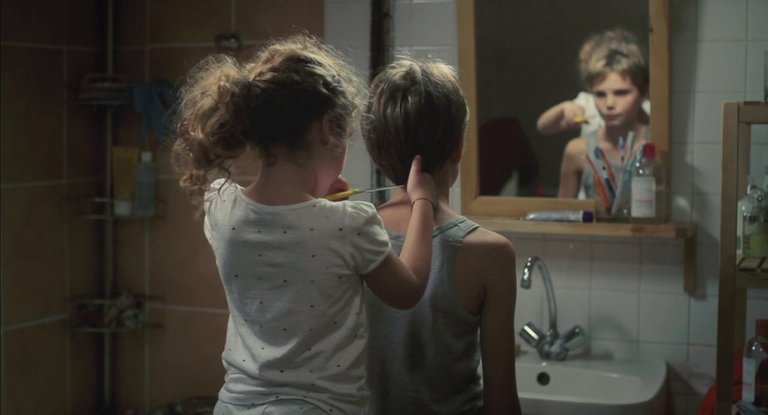
Like any modern, loving and understanding mother, Laure's mother accepts her short hair and her dressing however she wants. At home she talks to her, she sees her spending time with her little sister whom she loves and who loves her back, and Laure is a great girl and a loving daughter. But ther's something that her mother won't let her go through: lying. Pretending to be someone she's not and deceiving her neighbors and playmates is something that she doesn't feel right about and that's why - in the midst of a rather uncomfortable circumstance - she forces her to confess.
Como toda madre moderna, amorosa y comprensiva, la madre de Laure acepta que ella lleve el cabello cortísimo y que se vista como quiera vestirse. En casa habla con ella, la ve compartir con su hermana pequeña a quien ama y quien la ama de vuelta, y Laure es una gran chica y una hija cariñosa. Pero hay algo que la madre no le deja pasar: la mentira. El haber pretendido ser alguien que no es y haber engañado a sus vecinos y compañeros de juego es algo que para ella no está bien y por eso - en medio de una circunstancia bastante incómoda - la obliga a confesar.
I can't help but wonder what each of us would do in that situation? If we accept that our children are growing, discovering themselves and developing their personalities, how can we preach them for pretending to be someone else if they may not even know who they really are yet? How can we help them discover it without pushing them to one or the other side of the dividing line of prejudice and acceptance? Should we set limits according to social conventions? How do we define them then? It's a rather complex subject that the film deals with subtly and without giving answers, just by posing the questions. Tomboy is written and directed by Céline Sciamma (the mastermind behind Portrait of a Lady on Fire, one of the most beautiful films of recent years) who already worked on the subject of childhood in Petite maman, although in a different way. The photography and the script of each of her films are wonderful and she plays with the power of simplicity and unexpressed feelings. It's obvious that Laure has doubts, that to sustain a lie she must tell others and that, when she's discovered, she will lose much of what she gained with her other version, but even so, despite the mother's sermon, there is love, there is support (Jeanne is so beautiful, sweet and understanding with her sister at all times), a will to understand and at no time do they leave her alone and I think that is one of the most redeemable things in the story, have you seen Tomboy? I read you in the comments.
No puedo evitar preguntarme ¿qué haríamos cada uno de nosotros en esa situación? Si aceptamos que nuestros hijos están creciendo, descubriéndose y desarrollando su personalidad, ¿cómo podemos reclamarles pretender ser alguien distinto si quizás aún ni siquiera saben quiénes son en realidad? ¿cómo podemos ayudarles a descubrirlo sin empujarlos a uno u otro lado de la línea divisoria de los prejuicios y la aceptación? ¿debemos establecer límites de acuerdo a las convenciones sociales? ¿cómo los definimos entonces? Es un tema bastante complejo que la película trata con sutileza y sin dar respuestas, sólo planteando las preguntas. Tomboy está escrita y dirigida por Céline Sciamma (la mente maestra detrás de Portrait of a Lady on Fire, una de las películas más hermosas de los últimos años) quien ya trabajó el tema de la infancia en Petite maman, aunque de una manera diferente. La fotografía y el guión de cada una de sus películas son maravillosos y juega con la fuerza de la sencillez y de los sentimientos no expresados. Es obvio que Laure tiene dudas, que para sostener una mentira debe contar otras y que, al ser descubierta, perderá mucho de lo que ganó son su otra versión, pero aún así, a pesar del sermón de la madre, hay amor, hay apoyo (Jeanne es tan hermosa, dulce y comprensiva con su hermana en todo momento), voluntad de entender y en ningún momento la dejan sola y creo que esa es una de las cosas más rescatable de la historia, ¿ustedes han visto Tomboy? Los leo en los comentarios.
Reseñado por @cristiancaicedo
Other posts that may interest you | Otros posts que pueden interesarte:
  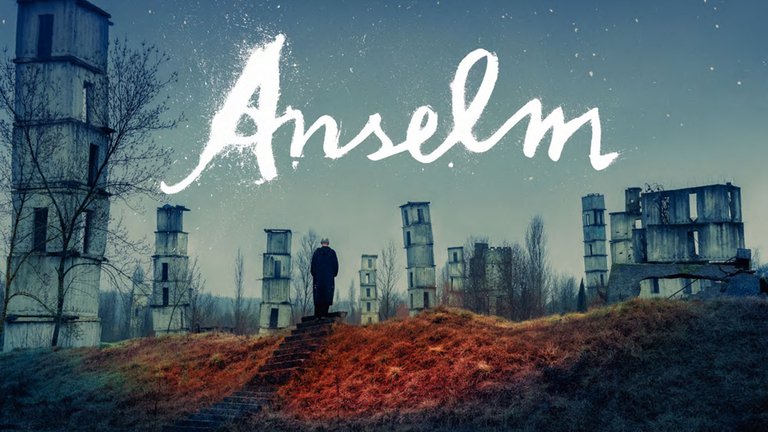 |
|---|
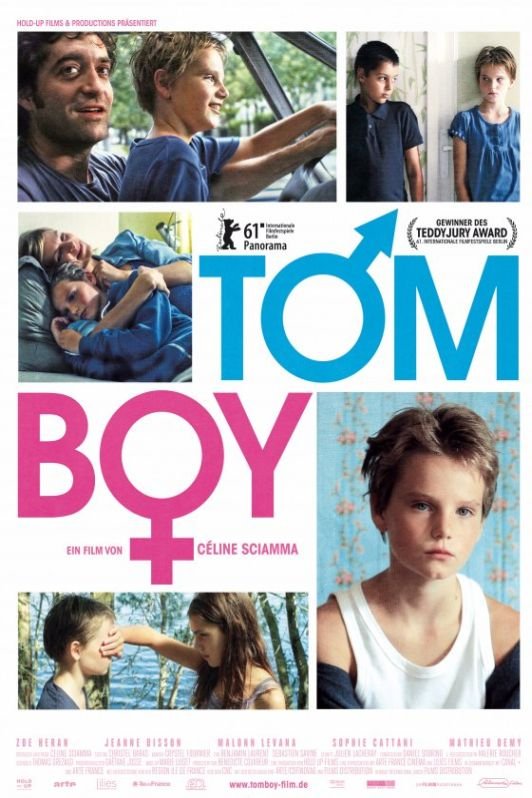


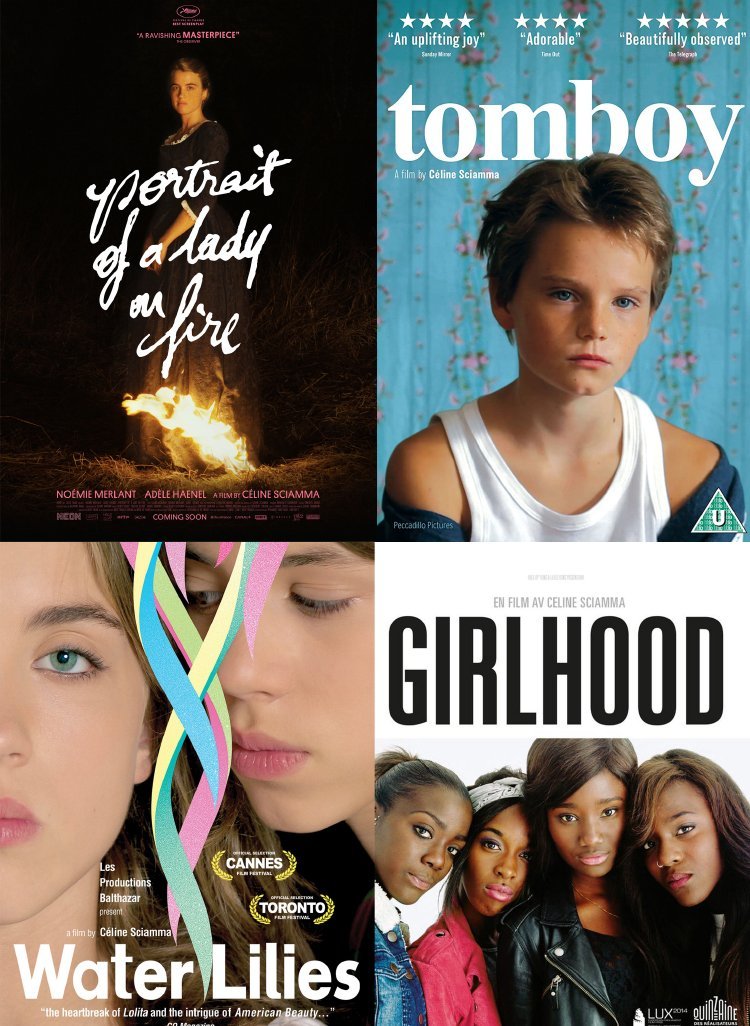
A work of art that I believe could have been awarded more prizes.
A topic that we must discuss until we understand what positions to take and what we can, as a society, contribute so that there is freedom and less pressure.
Excellent, @cristiancaicedo
Opino lo mismo, pudo haber sido más premiada y es un tema que debe conversarse. Saludos y gracias por leerme.